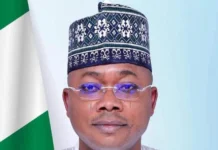To mitigate the impact of COVID-19 on infrastructure, MSMEs and vulnerable Nigerians, critical stakeholders at a two-day retreat converged to evolved strategies for transparency and competence in distribution of emergency intervention funds.
The retreat for members of the Federal COVID-19 Action Recovery and Economic Stimulus (CARES) Steering Committee was organised by the Federal Ministry of Finance, Budget and National Planning in Lagos.
Live and virtual experts at the forum stressed the need for leadership competencies to provide immediate succour through the emergency funds provided by the World Bank to states.
They called on governors to carefully study designs and implementation elements to understand the procedures and implications before signing for the proposed loans.
The participants as well as members of the committee were led to the event which closed on Saturday, by the Minister of State for Budget and National Planning, Clem Agba.
The Programme was part of Federal Government’s interventions to ease COVID -19 pandemic impact on citizens, infrastructure and the economy with support of the World Bank funding for states.
The Executive Director, Nigerian Governors Forum (NGF), Dr Lateef Shittu pledged the commitment of benefiting state governors to the success of the initiative to boost economic and social well-being of citizens.
Shittu said the $750million CARES programme which had been developed to support poor, vulnerable households, farmers, SMEs and facilities for the recovery of local economic activities was timely to revamp national economy.
“As key stakeholders in the Nigerian agenda, the Nigeria governors ‘forum and indeed all states governors of the federation applaud the programme,’’ he said
He said the secretariat of the NGF was ready to adopt best practices across the federation in the implementation of the programme.
In the same vein, the Minister of Industry, Trade and Investment, Niyi Adebayo, described the loan facility to be provided by the World Bank over a period of two years from 2020-2022 as ‘very noble and apt’.
He said the loan would help to provide some common facilities across the nation and also support for the MSMEs in retooling and up-scaling their businesses.
He listed various programmes and policies of his ministry which he noted had “a robust process to reach the downtrodden“ in addition to collaboration with the Bank of Industry (BOI), and other partners.
Meanwhile, the Minister of State for Budget and National Planning, Clem Agba said the stressed that the initiative was meant to provide members of the National Steering Committee of NCARES the opportunity to review the work the Preparatory Team had done in the last two months.
Agba said lockdowns crumbled economic activities, causing massive job losses and supply chain disruptions to compound existing poverty and vulnerability levels in the nation before COVID-19.
He explained that the best approach to fighting recession was investments, stating that putting more funds into economic growth was the only known stimulant for recovery.
He said that the combination of the government Intervention Fund and the World Bank loan if expended judiciously would tame job losses, guarantee food security and boost economic activities and livelihood.
“As every country is dealing with varying degrees of the COVID-19 problem, the global economy is also confronting its sharpest reversal in generations, with nowhere to turn to for help.
“The government has therefore set out funds for Agriculture and SMEs, but more funds are still needed to pull us out of recession; and that was why the intervention from World Bank $750million loan is a welcome opportunity for the government, especially the state governments who are the ultimate beneficiaries of this loan,’’ he said.
The Minister of Agriculture and Rural Development, Muhammad Nanono, while acknowledging the negative impacts of the pandemic listed efforts of his ministry to cushion the effects.
Nanono called on committee members to pay attention to the design elements to ensure timely actaulisation of objectives and gave assurances of his ministry’s support.
“My pleasure comes from the fact that we have a caring government in good standing and relationship with our supporters: The world Bank who had agreed with the states to design a multi-sectorial programme that would provide immediate emergency relief to the vulnerable and poor smallholder farmers and SMEs, using a USD$750 million credit over a two-year period (2021-2022).
“This is intended to be disbursed through three Results Areas as programme for results at the states levels .
“I am aware that of this amount, an estimated sum of USD$299 million was requested for, by all the 36 states and FCT in support of results area 2 of the programme that anchors the food security and safe functioning of food supply markets,’’ he said.
The World Bank Country Director for Nigeria, Mr Shubham Chaudhuri who joined virtually said the NCAREs was a timely response to cushion the effects of COVID-19 compounded by dwindling oil revenues.
He said that the World Bank had programmes for fiscal response of states and also programs for extensive discussions with states.
“Because this is a programme for results, we spent a lot of time clarifying what states are doing with designs of implementations and roles of ministries as to the roll out of programmes.
“We are here to support Nigeria at this critical time of need,’’ he said.
Chaudhuri stressed the need for collaboration with civil societies who need to monitor to ensure COVID-19 responses were seen and felt by Nigerians.
The Managing Director, Bank of Industry (BOI), Mr Olukayode Pitan said the bank would continue to empower MSMEs and support states in the progress of the NCARES initiative leveraging on technology.
He said that MSMEs were a critical component of the nation’s economy which the World Bank had engaged the BOI to assist states in running the programmes to ensure NCARES success.(NAN)




